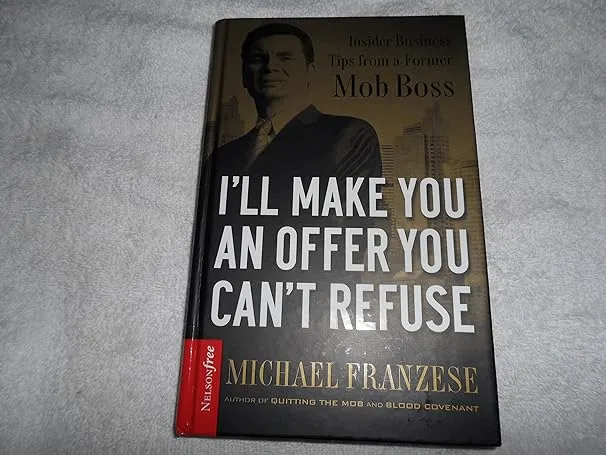About this book
Five Key Takeaways
- Mob strategies offer valuable insights for legitimate businesses.
- A clear business plan is essential for success.
- Integrity and ethics are crucial for sustainable growth.
- Failures provide important lessons for future success.
- Listening actively can lead to better decision-making.
-
Mobsters Use Solid Business Strategies
Running a mob organization mirrors corporate structures because both involve efficient management and focused strategies for success (Chapter 1).
Despite engaging in illegal activities, mobsters effectively utilize relationship-building, adaptability, and strategic planning, all of which are essential for legitimate businesses.
This demonstrates that creativity and adaptability—not intimidation—are key to sustained success in any venture, legal or otherwise.
In business contexts, this provides a framework for thinking beyond traditional approaches to create innovative strategies and manage risks effectively.
Organizations that fail to build strong networks and neglect strategic foresight can face stagnation, regardless of the industry.
By adopting these principles and focusing on creating value, businesses can thrive without relying on unethical shortcuts.
Ultimately, recognizing the overlap between street smarts and smart management boosts a business professional's ability to navigate complex challenges.
Understanding these practices helps bridge the gap between intuition and structured strategy, creating long-lasting solutions for competitive advantages.
-
Establish a Clear Business Plan
Starting or managing a business without proper direction can lead to wasted efforts and resources.
Begin by drafting a focused, written plan with specific goals and actionable strategies for achieving them.
Structure your plan to include both short- and long-term objectives, and revisit it periodically to ensure relevance and feasibility.
A solid plan provides clarity and keeps you grounded, especially during challenging situations or when tempted to chase quick, uncalculated wins.
Following a structured plan boosts accountability, enhances resource allocation, and helps measure progress effectively.
This approach increases your ability to adapt strategically, ensuring you're always aligned with your core business values.
Without a thoughtful business plan, the chances of wasting effort on fruitless activities increase significantly.
-
Deceit Creates a Toxic Environment
Using deceit to achieve success appears to provide quick gains but often leads to catastrophic consequences for businesses.
Dishonest practices corrode trust among employees and partners, creating an environment where loyalty is enforced by fear, not respect.
Over time, such an environment destabilizes organizations, stifles innovation, and damages morale, leaving companies vulnerable to competition.
The author suggests that integrity is the cornerstone of sustainable success, as deceit eventually leads to loss of reputation and trust.
From a broad perspective, businesses that prioritize honesty over short-term wins retain lasting credibility with customers and colleagues.
This approach is supported by examples of companies that collapsed under the weight of their fraudulent actions and toxic cultures.
The author's argument is compelling: building trust and acting ethically results in financial stability and personal fulfillment.
Ultimately, success built on deceit is unsustainable, while transparent and ethical practices ensure growth and legacy.
-
Listening Beats Talking in Business
Controlling your words and actively listening can transform interactions and decision-making in life and business (Chapter 5).
Speaking impulsively often results in misunderstandings and missed opportunities. By contrast, listening first builds clarity and reveals others' true intentions.
This approach allows thoughtful responses, creating respect and trust in negotiations or conflict resolution scenarios.
Listening is an underutilized skill that, when mastered, stabilizes tense situations and sharpens business instincts.
Effective communication isn't about dominating the conversation; it's about understanding, which forms the foundation of strong partnerships.
Prioritizing listening improves problem-solving, diminishes conflict, and leads to informed, strategic decisions.
Businesses benefit tremendously from leaders who know when to speak and when to stay silent, fostering cooperative environments.
In professional interactions, listening actively rather than speaking reactively ensures long-term success and solidifies professional relationships.
-
Master the Art of the Sit-Down
Traditional corporate meetings often lack focus, leading to wasted time and unresolved issues.
Adopt the sit-down approach: promote clarity, respect, and a specific objective while eliminating distractions from negotiations.
Through sit-downs, participants arrive informed and prepared, knowing that resolutions are final and critical decisions won't be delayed.
This format encourages efficiency, respect, and productive problem-solving during discussions, whether resolving conflicts or deciding strategies.
Using this structured approach prevents unnecessary detours and ensures conversations remain purposeful, avoiding wasted time and energy.
Taking such steps strengthens business partnerships and results in quicker, actionable results, reducing decision-making fatigue.
By prioritizing focus and respect, businesses adopting the sit-down method achieve collaborative goals faster and forge stronger bonds.
-
Choose Solomon Over Machiavelli
Success often forces individuals to choose between pragmatic, Machiavellian methods or values-based, Solomonic principles.
While Machiavelli advocates for ruthless tactics, they often result in long-term damage to reputation and relationships.
The author highlights how adhering to Solomon's wisdom—emphasizing honesty and fairness—leads to sustained success and personal satisfaction.
Businesses that operate with integrity overcome challenges with dignity and build deeper customer and stakeholder trust.
The allure of Machiavelli's shortcuts may appeal in tough times, but they compromise long-term credibility and success.
The author argues passionately for adopting a Solomonic approach, stating that businesses thrive most when built on morals, not manipulation.
This perspective reminds professionals that principles, not profits, ensure lasting fulfillment in both life and business.
Choosing integrity creates a legacy worth leaving, while abandoning ethics for gains risks everything meaningful in the process.
-
Learn from Failures, Don't Fear Them
Failures are an inevitable part of any business journey, but they shouldn't be seen as insurmountable setbacks.
Take time to analyze failures and extract valuable lessons to improve future strategies and decision-making.
Document what went wrong, identify patterns in mistakes, and apply this knowledge to strengthen your team and plans.
Facing failures with courage also builds resilience, allowing you to recover quicker and approach future challenges smarter.
By learning from painful experiences, you avoid repeated errors and gain actionable insights for innovation and progress.
Embracing failures also builds humility and adaptability—key traits for any business leader aiming for sustainable success.
Ignoring or fearing failures holds you back, while confronting and learning from them refines your path forward.




















